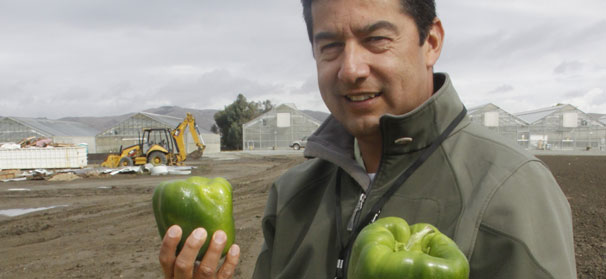

Dec 16, 2011Pumpkin production up
Pumpkins belong to the cucurbitaceae family, which also includes cucumbers, squash, gourds, cantaloupes and watermelons. They grow best on soils with a pH of 5.8-6.6. Because they require a constant supply of moisture, soils with good filtration and water holding capacity are ideal. Pumpkins are a warm season annual crop and require 90-120 frost-free days to reach maturity. They are very sensitive to cold temperatures and even a slight frost can cause injury.
In addition to soil, sun, water and seed, pumpkins need bees for complete pollination and fruit set. Pumpkins have both male and female flowers so bees are needed to transport the pollen from the male to the female flower.
In fact, bees are so important that growers often rent one-two hives per acre to ensure optimal yields. Since pollination occurs at different times, multiple harvests are common.
According to the Agriculture Marketing Resource Center, in 2011 pumpkins harvested from 48,500 acres in the United States were valued at $116.5 million. Illinois leads the nation in production and is followed by California, New York, Ohio, Pennsylvania and Michigan. Illinois also led the nation in the number of acres planted in 2010 (15,400 acres), however Michigan ranked second with 7,400 acres dedicated to pumpkins. In Michigan, pumpkins are grown primarily for processing and jack-o-lanterns. In 2010, Michigan growers harvested 95.2 million pounds with a total production value of 13.8 million.
Between 90-95 percent of the processed pumpkins in the United States are grown in Illinois. Morton, located in central Illinois, is the self-proclaimed pumpkin capital of the world. Morton is also the headquarters of the Libby’s pumpkin processing plant, which is owned by Nestle Food and cans more than 85 percent of the world’s pumpkin each year.
Due to extremely wet conditions in central Illinois in 2009, there was a shortage of canned pumpkin and pumpkin pie filling on the grocery shelves. In 2010, Libby’s expanded their contracting to acres beyond central Illinois into Michigan and they started planting earlier.
“Processing pumpkin represents a valuable new market for many Michigan vegetable growers and the processors for whom they grow,” said Norm Myers, Michigan State University Extension Senior Vegetable Production educator. “Michigan vegetable growers are hoping to expand acreage in future years.”
When it comes to Michigan agriculture, there is much to be thankful for and pumpkins are among the state’s plentiful bounty.
By Mary Dunckel, Michigan State University Extension














